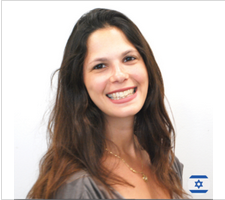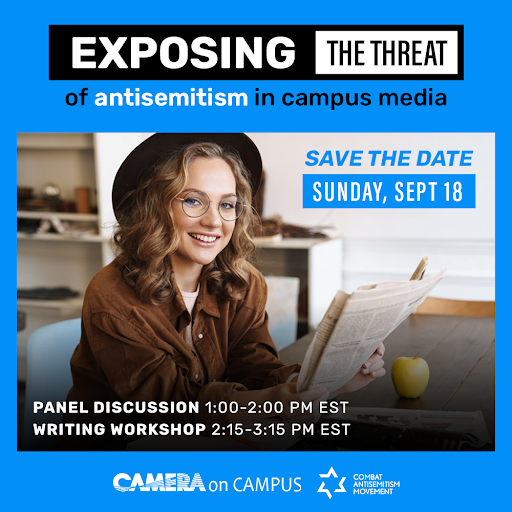Campus media outlets have become a new front in the fight against Jew-hatred in recent years, amid a global surge of antisemitism that has hit colleges and universities particularly hard.
To raise awareness of this pressing issue, the Committee for Accuracy in Middle East Reporting and Analysis (CAMERA) and Combat Antisemitism Movement (CAM) are hosting on Sunday, September 18th, at 1:00 PM EST, a special online event titled “Exposing the Threat of Antisemitism in Campus Media” (REGISTER TODAY) — featuring a student panel discussion, followed by an interactive workshop led by Times of Israel Founding Editor David Horovitz to guide students through the process of getting articles published in their school newspapers.
Looking ahead to this forum, CAMERA International Campus Director Aviva Rosenschein spoke with CAM Editor-in-Chief Barney Breen-Portnoy about the reality Jewish and pro-Israel students are dealing with, with a focus on the need for them to have their voices heard.
What are the main challenges Jewish and pro-Israel students are contending with on campuses?
“The biggest challenge Jewish students are facing today on campuses is intimidation — from their peers, from their professors, and from organizations they would want to participate in but to do so they would have to hide their identities.”
“We used to say back in the day at CAMERA, we never mentioned the word antisemitism. Other organizations talked about antisemitism, we talked about anti-Israel activism. There was, at many times, a difference. But you can’t say that anymore. It’s all antisemitism now, which is shocking. It wasn’t always so clear-cut, but now it’s blatant. It has nothing to do with politics. There really is severe intimidation and bullying just for being who you are.”
“We’ve started seeing Students for Justice in Palestine (SJP) chapters holding events on ‘What Is Antisemitism?’ And they’re deciding for the Jews what constitutes antisemitism. Non-Jews are telling us what antisemitism is. Would that happen to any other type of minority? Would anyone tell the African American community what constitutes racism or the LGBTQ community what’s homophobic? It’s ridiculous. There was always a line, you couldn’t tell another minority what’s discriminatory toward them.”

What strategies do you suggest to students to deal with these issues effectively?
“Something we work with our students on, whether they’re a CAMERA Fellow, part of a coalition group, or just a student who needs support in any way, is they need to be educated, they need to be knowledgeable about the subject they’re speaking about, and they have to confront it. If Jews and Zionist students don’t say anything, then no one is going to think there is any type of problem.”
“What we work with our students to do is, and what we encourage students in general to do, is not only to be aware of what is going on in Israel, but you have to share this information. You have to have your own activities, share it on social media, and write about it. And you have to talk about Israel in all capacities. It’s not just a war zone, in any shape or form. People should know what the situation in Israel is like, positively as well.”
“Our number one tool at CAMERA is the pen — to write and to expose. You get published in one place, it gets picked up, it gets shared all over social media, and it really makes an impression on the students. And one of the best ways to reach a broader student audience is to get published in a campus media outlet, because this goes beyond the pro-Israel and Jewish communities, it reaches the average student.”
“If a speaker comes to campus and spews anti-Israel hatred, our students attend those events and write about them afterward, to give students a different opinion than what was shared. Or if there are anti-Israel articles, our students will write pieces exposing point-by-point the mistakes and fallacies and correcting them.”
Has the handling of Israel-related issues by campus media outlets changed in recent years?
“What we’ve seen is that it’s become difficult on some campuses to get a pro-Israel opinion published. We’re hearing more and more from students, ‘This year, we can’t get published.’”
“This is for a number of different reasons. Sometimes it’s a lack of professionalism, student just not getting back to you, and there is no real agenda there. There are other examples where they don’t want to get political. If they post something about Israel, then they have to post something about the Palestinians, and they don’t want to bring that to their campus. So they push against it, even when it’s relevant. Another thing, which we’re seeing more of, is they publish anti-Israel articles, but take a very long time to get back to you if you want to respond, and it’s not exactly clear why. And your piece becomes not timely.”
“A lot of campus newspapers are just trying to ‘ghost’ students, censoring them without saying they’re censoring them. And average students are also being bullied and intimidated. They know they are going to be harassed by pro-Palestinian students and they don’t really want to deal with it. So they’re editing pieces to be in a place to be as PC and compromising as possible.”
“And then a few years ago there was The McGill Daily which actually came out and said, ‘We will not print articles that are supportive of Zionism.’ It was the first to do so in absolute voice, verifying their anti-Israel bona fides that were already clear. There was pushback, and the university said you can’t do that, but it’s still very difficult to get published there. For pro-Israel pieces, they have an addendum at the top almost as long as the article itself saying it’s not their view.”
“We’re now seeing newspapers at elite universities being more open, similar to McGill, with their support for anti-Israel causes, which is shocking. At the University of Chicago, The Chicago Maroon took down and apologized for piece against SJP. And then they published an article attacking the article they took down. Simply unbelievable.”
“At Harvard University, the editorial board of The Harvard Crimson came out in complete support of BDS. which is horrifying and completely against ethical standards of journalism. Although they at least published several opinion pieces against their move.”
“If Harvard can do it, and Chicago can do, then why can’t any other college do so as well? This is our next generation? ‘Journalists’ proclaiming their biases. This is something we have not seen before. And what does this mean for the Jewish students who are working for these newspapers?”
“This is a new strategy of the anti-Israel movement. First, they went to student governments, and now they’re trying to put their people into positions on the newspaper staffs, so then they can nullify any dissenting voices to their cause.”
How can this be countered?
“Why we organized this contest with CAM, and why encourage students to write, is, as the McGill example showed, campus newspapers can’t censor pro-Israel students like this, the universities won’t allow it. How was this proven? Because several McGill students submitted articles that were all denied. And then they went to the administration and said, ‘They’re denying our pieces, one after the other.’ So now they have to publish. That doesn’t mean they’ll publish every article. There still are issues here. But they will be addressed. The papers cannot not publish you.”
“We also need to get people into positions of leadership at campus media outlets. That is how we’re going to save this.”
Can you speak about the overall mission of CAMERA and CAMERA on Campus?
“The goal of CAMERA and CAMERA on Campus is to ensure accurate information is being shared about Israel. We do not take positions on the right or left, we do not take positions on any government policies or any future policy for Israelis and Palestinians, and Arab countries. We simply believe putting out accurate information will only help the situation.”
“We work with students who are very knowledgeable about the Arab-Israeli conflict and who are eager to educate their peers and actively share information on Israel, whether it’s through writing articles, holding educational activities and posting on social media. We’re researchers, we’re fact-checkers, and we’re activists. That’s what CAMERA is. We believe in speaking out. Sometimes all a student needs is to see a voice of dissent to give them the confidence to speak up, and not just take everything as fact.”


